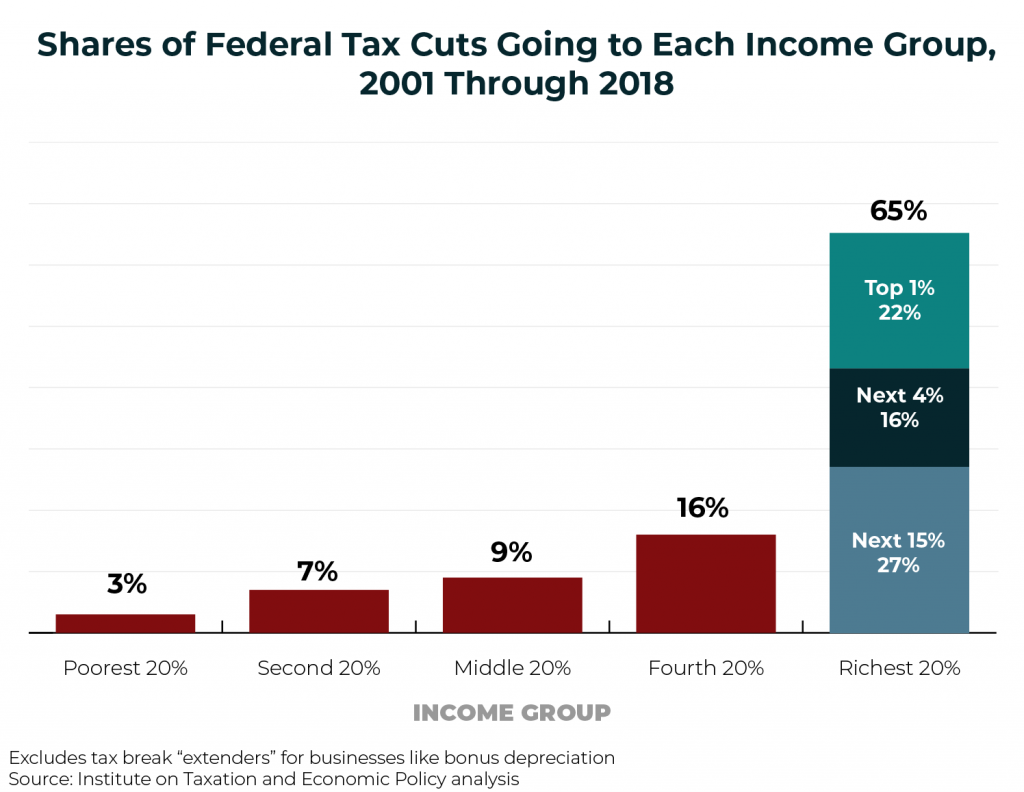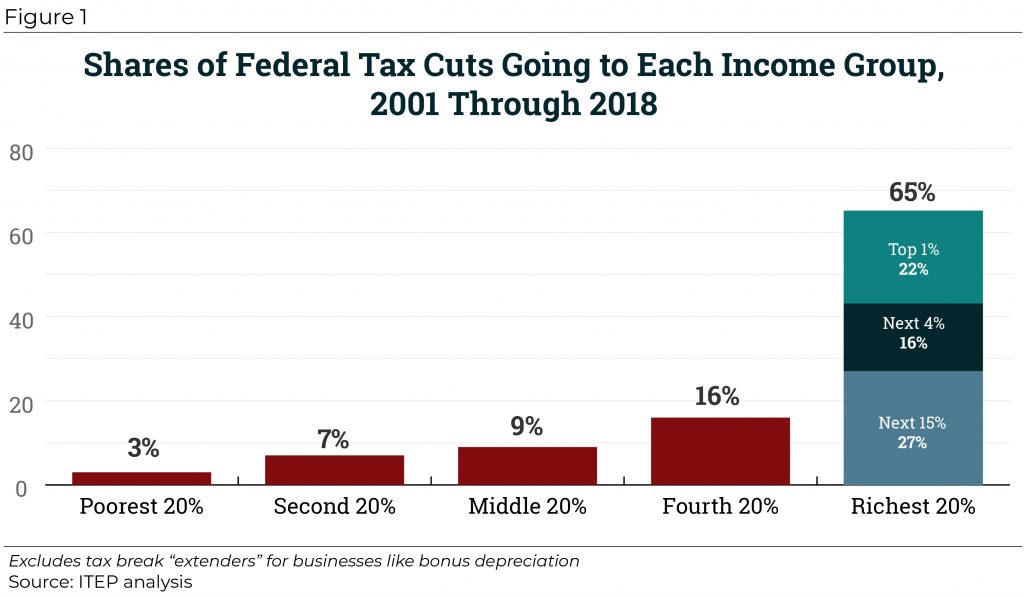By Amy Hanauer
Committed protestors and many years of work from Black Lives Matter and other activists have helped spur a sea change in public opinion and policy possibility on dismantling systemic racism in policing. The Institute on Taxation and Economic Policy stands with activists who are guiding this movement to transform America. Real change suddenly feels possible as policymakers respond to protests with action.
School districts and university systems have committed to no longer using police as security guards, city leaders have vowed to redirect funding from police departments toward other first responders, and Democrats in Congress have introduced and nearly garnered a majority of votes for a bill that would make it easier to prosecute and track police misconduct, among other reforms. Radically altering policing will require far more than this, but public imagination and political will are inching toward transformative policies to replace a system that often ignores Black people’s humanity, responds to poverty and social challenges with incarceration, and administers “justice” unequally.
Change must come. As horrifying as the nearly nine-minute video of a police officer kneeling on George Floyd’s neck until he took his last breath is, we know that the incident is no anomaly. The ubiquity of cell phone video in the last decade has exposed a longstanding truth: Black lives are too often disregarded under the cover of criminal justice. Policing, though, doesn’t happen in a vacuum.
Racist policing intertwines with other social and economic manifestations of institutional racism. Policymakers must remedy broader injustices to move the nation closer to living up to its ideals.
Emory University professor Dorothy Brown recently said, “I could draw a line from what is happening to the economic divide. When we think about state and local government budgets and how much of taxpayer dollars, including Black taxpayer dollars, that are spent on policing as opposed to social programs, yes, there’s a direct line.”
Government budgets, whether local, state or federal, are not merely financial line items. They are a statement of values and priorities. When governments give police military-grade weapons and impunity to do violence—and more than 95 percent of arrests are for non-violent offenses—that uses people’s own tax dollars against them. If people are jailed because of a mental health crisis, local government is valuing penalty over compassion. Incarceration should be reserved for keeping communities safe but is often weaponized against non-violent offenders.
As is, the U.S. underinvests in most public essentials when compared to other wealthy democracies, and it has for many years. A focus on keeping tax rates low has allowed wealth to concentrate among an elite few and also produced racist outcomes.
In jurisdictions across the country, state tax policies that fail to raise adequate revenue create an incentive for local governments to issue tickets for moving and parking violations, raise fines for minor infractions, and criminalize missed payments of fines and fees. The most notorious example of how this adversely affects Black communities is Ferguson, Mo. After a police officer killed unarmed Michael Brown in 2014, the U.S. Department of Justice undertook a civil rights investigation. Its 2015 report found every level of government in Ferguson, including police, the local prosecutor and city management, participated in a system that disproportionately targeted Black residents with fines and fees. The city used millions in revenue from these fines to fund city government.
A recent study found that a higher proportion of Black residents correlates with more fines and fees to fund local government. This isn’t happenstance. Government-sanctioned redlining during the last century and the persistent challenge of property devaluation and disinvestment in lower-income Black communities strips them of wealth, good jobs and a strong tax base. Current policy choices compound the problem. An expose last year in Governing found that “most fine-reliant jurisdictions incurred steeper state funding cuts than elsewhere nationally over the last decade.” States can take steps to mitigate this harm by giving more taxing authority to local governments.
The federal income tax is slightly progressive, raising more from those more able to pay. Federal policy also includes the Earned Income Tax Credit (EITC) and a Child Tax Credit (CTC), which direct dollars to low-income working families. But the U.S. tax system has never been as progressive as it could be. The federal tax code taxes capital gains income at lower rates than income earned from work, and laws enacted during the Bush and Trump administrations eroded the estate tax. Both these policies benefit wealthy white people most. In 2017, Trump and the Republican Congress took an ax to taxes on corporations and the rich. The next year, 91 of the most profitable companies, like Amazon and Chevron, paid nothing in federal corporate income taxes. This act supercharged the racial wealth divide, sending nearly 80 percent of its largesse to white households and about 72 percent to the richest 20 percent of earners. When combined with lower overall revenue, this made the federal tax code less a part of the solution and more a part of the problem.
Most state and local tax systems (45 out of 50) are upside-down, taxing low- and middle-income families at a higher rate than the wealthy and capturing a larger share of income from Black and Hispanic families than from white households. This is due in part to many states’ over reliance on regressive sales taxes. Flat income tax structures or lack of income tax at all prevents states from raising revenue in a progressive way. Instead of addressing income inequality, state tax systems exacerbate the income gap overall and also the Black-white income gap.
Anti-tax advocates’ stated agenda is to drown government in the bathtub. President Trump’s budget proposals every year call for a social contract that requires less contribution from the wealthy and decimates K-12 education funding, health care, environmental protection, food assistance and other safety net programs. The anti-tax agenda is a pillar of the decades-old Southern Strategy, which traded in racial resentment and Black stereotypes to reduce support for government spending among white people of all economic classes.
In a powerful New York Times essay, author and scholar Michelle Alexander wrote, “Too many citizens prefer to cling to brutal and unjust systems than to give up political power, the perceived benefits of white supremacy and an exploitative economic system. If we do not learn the lessons of history and choose a radically different path forward, we may lose our last chance at creating a truly inclusive, egalitarian democracy.”
People are taking to the streets not only to protest George Floyd, Breonna Taylor and Ahmaud Arbery’s deaths but also to challenge a system that touts the myth of the meritocracy and personal responsibility when it comes to economic mobility but then paints the Black community with a broad, biased brush when it comes to policing. To forge racial justice and become the America we claim to be, we must dismantle institutional racist policies. The Movement for Black Lives starts its economic justice platform with a spot-on call for progressive restructuring of taxes. Progressive tax policy can spur deep investments in communities, help families afford childcare and college, provide healthcare for everyone, re-imagine energy consumption to stop heating the planet, expand parks and bike lanes and public transit. Economic justice can give workers a greater voice than corporations in our democracy. People are protesting because the moment for transformative change in policing and our economy is long overdue.






